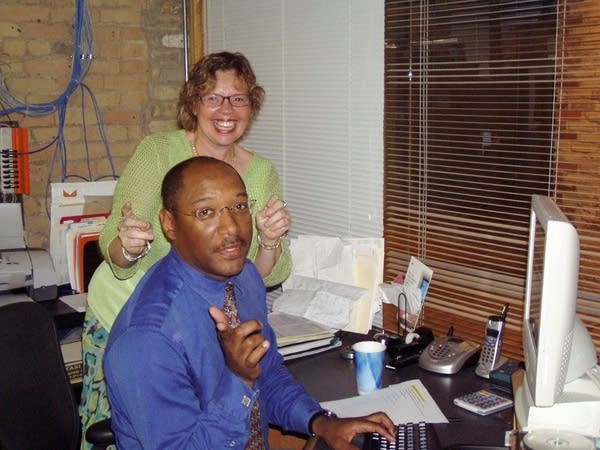New mag tries to connect minority business owners

Dia Satori and Jae Bryson had been running a paper aimed at the Twin Cities African-American population for about four years, when they decided to take on a new project. Satori's a veteran businesswoman with a history working at start-up companies in the medical-device industry. Bryson has nearly two decades of experience as a journalist. With their combined experience in business and media, they noticed some patterns.
First, there are a lot of minority-owned businesses in Minnesota. And second, those business owners weren't figuring prominently in local business publications. Satori says they decided to take a closer look.
"When we did our research, based on the last Census information that came out, it said there were almost 25,000 business owners of color in Minnesota that generated over $3 billion in sales and receipts. And we wanted to find something, and create something that would really help business owners of color connect with each other and get valuable information," she says.
So they started to think about how to encourage business owners to look more broadly for both investors and customers.
Create a More Connected Minnesota
MPR News is your trusted resource for the news you need. With your support, MPR News brings accessible, courageous journalism and authentic conversation to everyone - free of paywalls and barriers. Your gift makes a difference.

Satori says businesspeople of color can have difficulty finding funding, in part because they don't always have a wide network of contacts outside their own ethnic or local communities.
Satori and Bryson also wanted to give business owners a better appreciation of the buying power in minority communities. Jae Bryson says the corporate world has long been savvy about tapping into that power, but that's less true for business people of color themselves.
"I think the large corporations have made a commitment to diversity because they read the census data like anyone else," he says. "So I think they're at the forefront of saying 'OK, we're going to pick and choose these communities, where we're going to enter, what we're going to try to sell, what we're going to come away with,' whereas the communities of color have been slower at that. I don't know if there are political bad feelings, or perhaps just not looking over the fence at the other ethnicity."
Very often these communities are not easily visible or recognized by policy makers as they try to develop strategies to develop entrepreneurship. And yet this is one of the fastest-growing segments of the Minnesota economy.
Satori and Bryson launched Business Nation in September. The glossy magazine has a distribution of about 10,000 copies. It's available for free at a variety of businesses and college campuses around the Twin Cities, as well as by subscription.
The magazine's first issue included profiles of women business owners and articles on investors interested in early-stage companies. And it culled together potentially useful information about local organizations that can help business owners of color with financing, boosting sales, and training.
In addition to putting out the publication, Bryson and Satori have run a few networking events. Their "Dinner and a Dash" event operates like speed dating: business people get two minutes to introduce themselves or pitch their product. The aim is to encourage businesses to buy from each other or even collaborate.
The events are currently on hold and will resume in January.
Insurance agent Carlos Landreau, of the Minneapolis-based Landreau Agency, says he's enjoyed the Business Nation networking events he's been to so far. He says they've been useful in launching him out of his usual business circles.
"I'm part of the Hispanic Chamber of Commerce. I'd say 95 percent of the people there are of Hispanic background, so it's really sort of ethnic or geographically based. So I think what they're trying to do is forget about color or ethnic background and try to connect everybody together. I think that's of great value," he says.

Economist Bruce Corrie thinks Bryson and Satori's efforts could also be a useful tool for policy makers as well. He says Business Nation magazine can help shine a spotlight on minority and immigrant business developments.
"Very often these communities are not easily visible or recognized by policy makers as they try to develop strategies to develop entrepreneurship," Corrie says. "And yet this is one of the fastest-growing segments of the Minnesota economy. And it's good that these kind of publications come out because they help to bring visibility to what's going on, how these entrepreneurs are transforming the state."
A second issue of Business Nation magazine is due out later this month.
